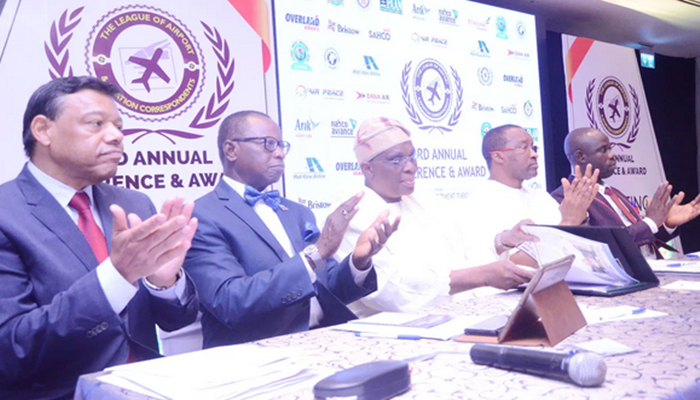Post-COVID-19: Experts call for review of Bilateral Air Services Agreement
They made the call at the third edition of the aviation webinar organised by a law firm, AELEX partners, on Friday in Lagos.
Mr Nick Fadugba, the Chairman of African Business Aviation Association (AFBAA), said the multiple entry points and the frequencies of foreign airlines had been a disadvantage to Nigerian airlines as opposed to the advantages the agreement was supposed to present.
“At the time the bilateral agreement was made, Nigerian airlines in play at the time were relatively new, and now to ensure the growth of the airlines, there’s a need to review the agreement to properly incorporate the airlines as the agreements do not favour the average Nigerian carrier.
“The multiple entry points have diluted the domestic market for the carriers,” he said.
Fadugba noted that there was need to overhaul the current business plans of the airlines with emphasis on unit cost, load factor and yield.
He said that for the airlines to rise above the current situation, there should be cooperation among airlines through joint training, Maintenance, Repair and Overhaul (MRO), spares pooling, joint operation, interlining and code-sharing.
Another panelist at the webinar, Ms Iyabo Sosina, an international aviation expert and former Secretary General of African Civil Aviation Commission (AFCAC), stated that the future of air transport in Nigeria was bright inspite of all the challenges at play now.
Sosina advocated the need for rebuilding and repositioning of the industry.
According to her, there is a need to focus on the Nigeria Civil Aviation Authority (NCAA) without unnecessary political interference with the authority.
She, however, advised that airlines in Nigeria should be reduced to about four, adding that these airlines must be able to boast of between 10 and 20 aircraft each.
Sosina also noted that more than ever before, there was a need for airlines to initiate collaborative ways of doing business as mergers could not be forced.
This, she said, would make the industry stronger to be able to compete on not just the domestic level but also on the regional and international scenes.
Also speaking, Dr John Arthur of Ghana Airport Company, said that airports need to start afresh by collaborating with each other and aviation stakeholders.
Arthur advised that African countries should come together to share expertise in order to make the aviation industry viable.
He also noted that countries should look at investing in non-aeronautical inclusions such as building malls in the airports.
Sindy Foster, the Principal Managing Partner at Avaero Capital Partners, stated that the Nigerian aviation industry had been in crisis before the COVID-19 pandemic.
According to Foster, the lack of capitalisation and the low propensity of Nigerians to fly has been a major issue.
“There is need to look into the factors frustrating the airlines business, one of which is the ticket prices. Multiple taxations should be removed to encourage airlines growth,” Foster said.
Foster, however, disagreed with the Nigerian government over social distancing on flights by reducing load factor to between 50 and 70 per cent.
She said the airlines were already in a dire situation when they were operating at full capacity and asking them to reduce the load capacity was another way of putting down airlines striving to get back on their feet post COVID-19.
The Regional Director, Advocacy and Strategic Operations at International Air Transport Association (IATA), Ms Adefunke Adeyemi, said the airline industry in Africa had experienced a revenue loss of about 6 billion dollars and flights were down by 94 per cent at the end of April.
Adeyemi stated that inspite of government implementing significant relief measures across the globe, there was need to do more.
According to her , IATA has advocated financial support for Africa from various organisations like UNWTO, World Travel and Tourism Council and the African Airlines Association (AFRAA).
Adeyemi, however, advised that in order to restart the aviation sector, it was necessary to restore public confidence in air travel, putting adequate health and safety measures in place to prevent the spread of COVID-19 while ensuring aviation essentials to jump start economies.
In his contribution, Mr Richard Gimblett, a Partner at Holamn Fenwick Willian, a UK-based law firm, while supporting the points made by other panelists, stated that governments across the world were devising measures to restart the aviation sector.
He said that the Nigerian government should not be left behind.
Gimblett advised that the government could restart the industry by providing direct financial support to passengers and cargo carriers, ensure relief on fees, charges and taxes, make forex available for technological innovations, while also engaging with the leasing and financial community.
The News Agency of Nigeria (NAN) reports that the Webinar panel of discussion was moderated by Theophilus Emuwa.
Emuwa, who is also the Managing Partner and Head of Tax at AELEX, said there was need for transparency in the management of funds for the aviation industry to grow.
NAN also reports that AELEX is a full service commercial law firm. (NAN)




